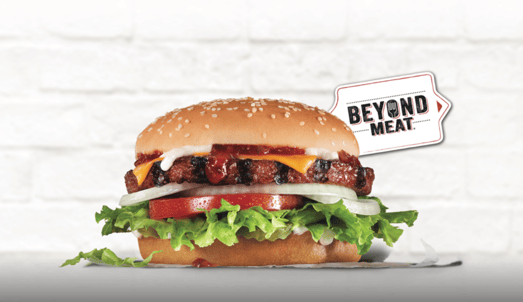Beyond the Beyond Meat craze: the future of plant-based menu items
March 4, 2020

2019 was without question a banner year for the meat substitute industry, as products from Impossible and Beyond caught fire with consumers and wound up on menus that include some of the biggest names in fast food and casual dining. Burger King alone enjoyed a 5% life in comp sales with the launch of the Impossible Whopper.
Beyond’s stock value has risen 200% since its IPO, and Impossible has a current valuation of between $3 and $5 billion, pointing to strong investor sentiment for this budding industry over the long haul.
And while restaurant brands are wise to respond to this surging demand, there are strong indicators of larger, and potentially even more lucrative, opportunities in the market as it relates to plant-based foods. Let’s break it down.
Beware the fake meat backlash.
With added attention comes added scrutiny, which has led some people to turn against the fake meat makers. The CEOs of both Whole Foods and Chipotle have dismissed these products as too processed to be healthy, while others argue that they don’t comport to GMO-free standards. Meanwhile, vegans and vegetarians have pointed out that as long as restaurants cook them on the same surfaces as regular meat products, they can’t be considered vegan or vegetarian at all.
Defenders point to the many plusses of alternative proteins, such as the reduced environmental impact needed for production versus real meat, and the health benefits of avoiding red meat and the all the growth hormones and antibiotics fed to cattle. Nonetheless, the industry is going to have to contend with all sorts of critiques, both real and imagined, if it expects to grow much beyond its current market share.
It’s about wants, not labels.
In a recent report on plant-based menu trends, Nestle discovered that only 4% of diners cite being vegan or vegetarian as a reason for choosing plant-based menu items. The real driver for well over half of those surveyed was simply that it’s healthier, with nearly the same number appetite appeal. Another recent study by Technomic echoed these findings.
In other words, people choose a plant-based menu items because they believe it’s better for them and will taste great, and not because they identify with a specific lifestyle.

For today's restaurant goers, choosing to eat plant-forward items isn't about being vegan or vegetarian, it's simply about being healthy.
Know what’s really preferred.
While sales of meatless meats are on the rise, this is due to a broader cultural shift of people seeking more plant-based protein sources, and not Impossible or Beyond products in particular. In fact, the same Nestle study indicates that only 15% of consumers want more imitation meat choices, while nearly 50% want menu items featuring true plant-based proteins in recipes, such as beans, nuts and grains. Overwhelmingly, consumers who choose a meat free meal would rather have an authentic, naturally raised protein over something formed in the lab. This alone points to a real opportunity for developing new menu items that will drive demand.

Consumers surveyed have shown a preference by more than three to one of natural, plant-based proteins in their menu items over lab created products like Beyond or Impossible patties.
Focus on the real potential.
Despite all the buzz around plant-based protein, much of today’s dining industry has a lot of catching up to do. Indeed, as of July of 2019, nearly half of the top 100 chains in the US still did not offer a single plant-based entrée on their menus. With 59% of American consumers choosing to eat meatless at least once a week, that’s simply missed revenue.
Real meat isn’t going anywhere.
For all the hype about the meatless burgers this year, it’s worth noting that the single most successful menu launch of 2019 was for a chicken sandwich. We break down the Popeye’s Chicken Sandwich craze here, but the bottom line is that people still line up for meat. When thinking animal versus plant-based protein, it’s not an either/or scenario.
For now, the smart brands will be the ones who make room for plant-based menu items while not walking away from the foods that they’re known for already. Finding the right balance will continue to be the key.




